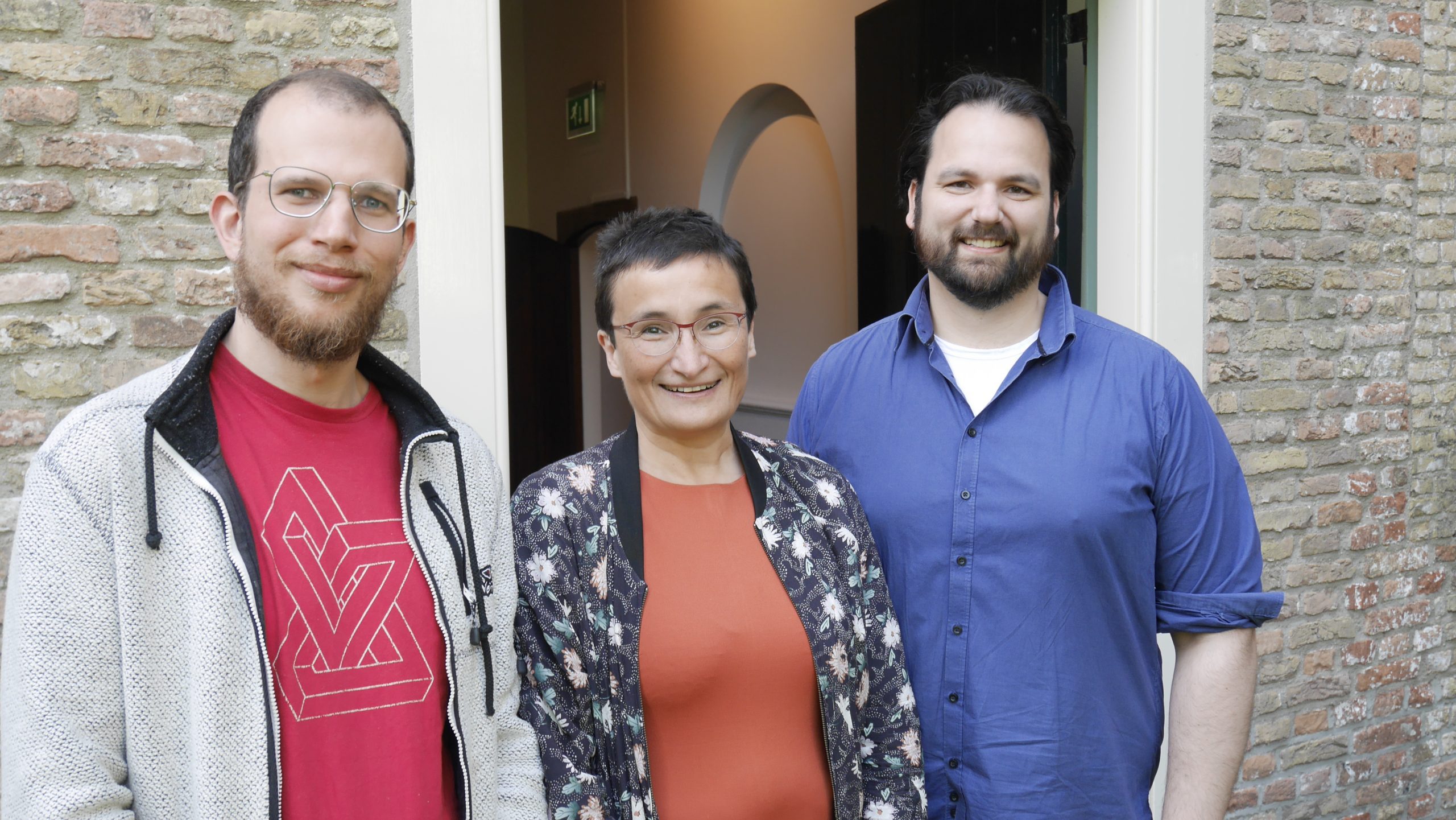An online learning experience with more debate than a regular Mooc. That is Mind of the Universe’s goal. The universities of Leiden, Rotterdam and Delft joined forces with the VPRO to create this virtual experience. Today, anyone anywhere in the world can join this futuristic ‘course’.
Virginia Dignum with her team. (Photo: Roos van Tongeren)
The Mind of the Universe makes the material that the VPRO (one of the Dutch national television broadcasters) shot for its own purposes available to the public and challenges people to use it. The material takes many forms, such as a paper, a robot, a music video, moving images or text. The universities offer the scientific support and in-depth facilitation on the VPRO’s material through a special platform where people can discuss the material and propose substantive arguments. “See it as an old-school forum, but better,” says Jordi Bieger, a postdoc at Delft. “No aggression, more structure and a better overview of all the arguments. This will make it a high quality discussion.”
Pick your track
Anyone interested in the experience can choose between three tracks produced by three universities. TU Delft’s, called Robots in society: blessing or cure?, is about robotics and is facilitated by Virginia Dignum, associate professor of Social Artificial Intelligence. The discussion will centre around building robots to benefit society.
The course by Leiden University, facilitated by Robert Zwijnenberg, is entitled Genetic privacy: should we be concerned? The course stimulates thinking on different approaches in the genetic privacy debate. The last course, by Erasmus University Rotterdam, is about the philosophy behind science and is called Science in progress: how to formulate the right questions?
“Watch lectures instead of Netflix”
All the lecture material will be accessible to and usable by anyone anywhere in the world. Really, all the material, even the bloopers and the uhs and oohs shot during filming can be used in any of the participants’ projects.
The issues of open access for everyone was a key priority for obtaining UNESCO funding. Professor Robbert Dijkgraaf, who was the starting point of the series last summer, echoes this priority. He believes that knowledge should be accessible to everyone on the planet, as does Rob Mudde, vice president education at the TU. “We want to share everything with everybody,” he says, “I hope people will watch lectures instead of Netflix.”
“Because we could tell the professors that it would be open for everyone around the world, a lot of doors opened and we could follow around forty scientists for three whole days,” says Rob van Hattum, chief of VPRO’s science section. “I think that public television has a role in making knowledge accessible for everyone.” The experience will be available in English in the Netherlands and in Spanish and French in the rest of the world, in line with the regulations of Dutch public television (but hey, if you want to see it in Spanish, go to Spain or use a VPN).
Not Mooc, but Mood
Virginia Dignum’s course consists of five weeks of study of around an hour a week. “It’s up to you if you want to spend more time on it,” explains Dignum. “It’s not like regular Moocs where I have to review the papers of the students. You can do whatever you want with the material, even build your own robot, ha ha!”
Dignum doesn’t call it a Mooc, but a Mood. “Massive Open Online Deliberation,” she explains. “We ask more questions than in regular lectures, where we give more answers. This enables people to actively form their own opinions on the subjects instead of reading about them in the media.” The experience is new and can be seen as a ‘living lab’. How it will turn out, is anyone’s guess. One question, for example, could be whether universities in the future should teach students how to use content rather than their providing content.
“We don’t know what to expect,” says Dignum. “Anyone can join the experience. The lectures are at an introductory level. Our goal is to reach a few thousand people within a year. Four hundred students from almost thirty countries have already signed up. We can reach people that we would normally never reach with lectures in Delft.”
Enthusiastic? Start your challenge or go directly to the 30 interviews
Roos van Tongeren / Redacteur



Comments are closed.